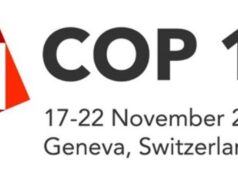BALANGA CITY – 2nd District Rep. Jose Enrique Garcia III on Monday announced he has filed three bills in Congress as response to existing and projected problems due to the coronavirus disease.
The new legislative measures are the Philippine Centers for Disease Control and Prevention Act, Use of Electronic Money Act, and a bill repealing the use of value-added tax with the current tax regime.
“This crisis has highlighted existing vulnerabilities in our health systems and even our economic systems. I think it is clear that we cannot go back to the way things were before if we want to better respond to similar problems in the future,” Garcia said
He said he believes that one of the first priorities should be the strengthening of existing governancestructures to better respond to infectious diseases in the future.
Center for disease control
Citing consultations with public health experts, Garcia said that one of the main reasons why certain countries had more success than others in dealing with the disease is the presence of a center for disease control and prevention.
“Countries that have shown greater success in the fight against this disease hinged their strategy on extensive testing and early detection of outbreaks. This was possible because they set–up a government agency dedicated solely to disease prevention and monitoring,” he explained.
He said his bill will establish the Philippine Centers for Disease Control and Prevention (CDC) as an attached agency of the Department of Health that will be headed by its own executive director.
The backbone of a CDC, he said, is the existence of a laboratory network with facilities possessing proper biosafety accreditation with the center serving as overseer and regulator that will open the doors for expanded testing capabilities.
Garcia explained that the bill aims to expand the Philippines’ laboratory network in the country. Thisexpansion entails the establishment of one Biosafety Level (BSL) 4 laboratory and at least five additional BSL 3 facilities, similar to the Research Institute for Tropical Medicine.
A facility’s BSL determines a laboratory’s capacity to handle dangerous viruses with BSL 4 facilities handling the deadliest pathogens.
The expansion of the country’s laboratory network will allow for the establishment of more BSL 2 facilities, the minimum requirement necessary to test or detectthe presence of viruses, he said.
“We need more surveillance and testing centers across the country. If we can set up our own CDC, then it will be possible for us to have facilities like RITM in at least all of the major islands in the Philippines. Local surveillance will be key in early detection, prevention, and response,” he said.
E-Money Act
With restrictions in movement because of heightened health and safety risks, the pandemic has also highlighted the need for alternative modes of economic transactions. Through the Use of Electronic Money Act, Garcia wanted to promote electronic money (e-money transactions as a safer and more efficient alternative to traditional cash–based modes.
Under Garcia’s bill, government agencies and local government units will be mandated to adopt e-money transactions as a possible mode of payment for government services. Merchants or businesses will also be required to be e-money enabled in order to secure a business permit from their respective LGUs.
Garcia believes that by institutionalizing this in institutions and organizations that people regularly interact with, the use of e-money in the wider population will be accelerated. He also said that it may also lead to easier and more efficient means of disbursing social assistance benefits to constituents in need who are currently mostly unbanked.
“If the wider population is e-money enabled, then we will not need to resort to traditional, physical means of distribution that are especially dangerous during the crisis we are facing now,” he explained.
Garcia also sees an alignment of opportunities with a law he principally authored, the Community-Based Monitoring System (CBMS) Act. The CBMS Act mandates all LGUs to collate and consolidate local data for planning purposes, down to the individual and household level. With the data coming from the CBMS, it will be easier to identify recipients of subsidy programs.
VAT repeal
Supplementing other proposed legislative measures to support the economy, Garcia is pushing for a repeal of the government’s current use of Value-Added Tax (VAT). A long-time advocate of this policy, the lawmaker believes that a shift to a sales-tax based computation scheme will plug current gaps in revenue generation as a result of the use of VAT in the existingtax regime.
The solon added that the pandemic-induced damage to the economy and government budgetary limitations highlight the need for the timely passage of this measure.
Maximizing revenue generation from proper tax policy may strengthen government capabilities to roll outresponses to the crisis such as providing cash subsidies, tax breaks, deferred rent and loan payments, reduced reserve requirement, and incentives he said.
“The current crisis has shown how important it is to place the proper economic safeguards for our people. The current tax regime is something that has placed a heavy burden both on government revenues and on tax payers who are already struggling to make ends meet as it is,” he said.
Garcia believes that the input tax deduction mechanism has produced loopholes in the system that has made it vulnerable to corruption. Repealing the VAT and replacing it with the sales tax system, he said, eliminates the loophole and ushers in a simple, straightforward, and easy to administer consumption tax.
“At the same time, the sales tax system eases the cost of doing business benefitting employers while equally favoring consumers due to the lower tax rate of 4%, translating to lower prices of goods and services and a lower inflation rate,” he added.
“This constitutes a tax break to consumers whose purchasing power could be severely impacted by the disruption of economic activities which may even lead to unemployment and/or cuts in pays. If taxpayers are financially challenged, a lower consumption tax rate is definitely a welcome tax relief,” he said.
New normal
Ultimately, Garcia believes that the country’s new normal must not be limited to just pandemic survival mechanisms.
“The new normal should also involve the institutionalization of policy reforms that should allow us to mitigate similar risks in the future and create a better future for our constituents,” he said.





